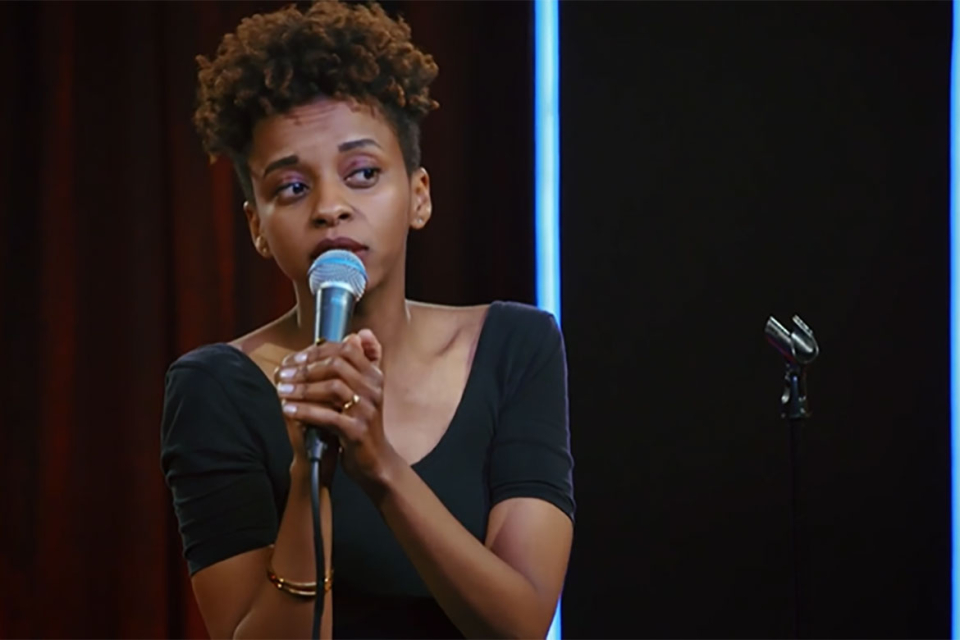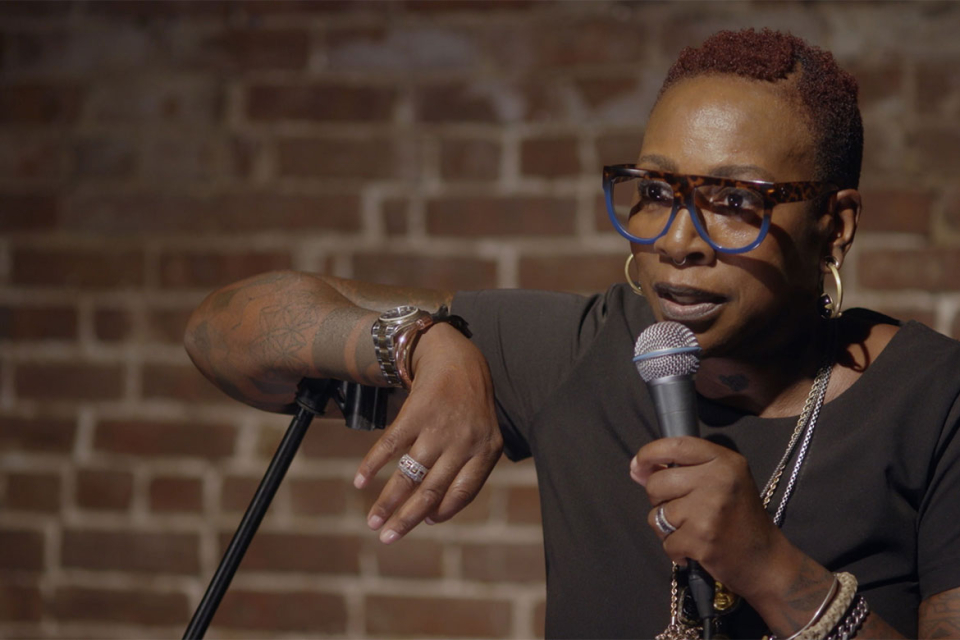Dark Humor is a docu-series looking at how Black Comedians integrate political humor into their routines.
Dark Humor, on Comedy Central YouTube, celebrates Black History Month. The series, a partnership with Color of Change, a progressive nonprofit civil rights advocacy organization, interviews various comedians from Roy Wood Jr to newer voice Sonia Denis.
Each episode discusses how black comedians navigate political humor into their routines. The comedians explain that for many, the Trump administration didn’t increase their political awareness but helped them lean into societal disparities. Black comedians have always been political, and some are more upfront "in your face," as can be seen via veteran Eddie Griffin’s comedy.
Others use sarcasm, such as is the case with Lil Rel Howery. This is a tradition that harks back to comedic icons such as Dick Gregory and Richard Pryor.
Another interesting aspect of the series is how the comedians translate to varying crowds. Black comics have synergy with Black audiences because of similar culture and experience, while white audiences hesitate to laugh when the subject matter touches on race or racism. One thing that is apparent is that female comedians are still fighting for visibility. Very rarely does one see two women on the same bill.
In order to better understand the gist of the series, we had the pleasure of speaking with Sonia Denis and Gina Yashere about their careers and what they would like viewers to gain from the series.
Sonia Denis, a relatively young stand-up, started out in Chicago and now resides in New York. We asked her to give her perspective on the landscape of comedy.
In your comedy, you openly discuss your bout with depression. Talk to us about how you became comfortable incorporating it into your routine.
Sonia Denis: I would say that for me, I’m an immigrant. I moved to this country as a child from Rwanda in the late 80s. Moving to this country, you have a lot of culture shock, obviously learning to speak the language and being a kid. The only thing you want to do is fit in and for people to like you.
I figured out that by being funny, I could get people to like me,. It’s also been a survival thing for a long time before I even started doing stand-up. Once I started doing it, I realized that if something painful happens to me, like the issues I had around mental health or lack of acceptance with my peers, whatever it was, if I could make that funny it diffused any power it had over me.
What are some of the challenges facing Black women comics in this modern era?
When I first started, I was doing stand-up in Chicago. It's a much smaller pool of comedians, obviously, but it was still male-dominated. I say it's changed a lot. If I saw one other woman, I'd be genuinely stunned. I would say, especially living in New York and doing stand-up in New York, there are way more women.
I think you're right in that when we think of someone like [comedian] Mo'Nique and her resume, there's still a notion that men are funnier, quote-unquote, and women are not. I'll have people, someone, come up to me and say, “I usually don't enjoy women, but I loved you.”
You talked about how in Dark Humor a woman comedian must have a specific look.
There used to be a stereotype of a female comedian, but now who cares? It’s whatever you want to talk about, as long as you can make that funny, then that's the point of it. The more you set yourself up or try to make jokes that you think other people look for, the less funny you are. The more inhibited you are, the more the audience can feel that tension in whatever you're trying to convey.
That’s not how comedy works. I would like to see more female comedians talking about whatever they want without having to worry. There still needs to be more Black female comedians, regardless.
Has the pandemic affected your comedy?
I think whenever I'm on stage; if I am in a place of crisis or anxiety, or something just happens to me, it just comes out. Now I think with comedians at most comedy shows you see them try to commiserate and be shocked, like when will this end? In the end, I think people value laughs.
There was a small period in the summer where the weather was nice enough, and the restrictions in New York had kind of loosened, where we had stand-up shows outside of parks, such as Prospect Park, and on steps of like, buildings, etc. People were just so happy to laugh about what had been happening the last six months at that point.
I think now it's even more important to just say, this is what's happening, and let's talk about it, and look at it, and laugh.
What do you want the viewer to get out of Dark Humor the series, especially non-Black people?
I would say, "White people, black people have been watching Friends, we've been watching your Frasier, we were watching your Roseanne and we understand what's going on. I think that in the world that we're trying to get to post-George Floyd, there is no such thing as a show that centers on Black people and is only for Black folks.
There are certain movies, such as Love Jones, that most Black people of a certain age have seen that are part of the Black vernacular. Black people have always been a part of stand-up. I don't think that white people should feel like this is foreign to me. This is a show that centers Black comedians and centers the Black experience, but it’s universal.
I remember when I first started in Chicago, I was parked on North Side because that’s where I lived. Chicago is a super segregated city. I didn't realize at the time that we were doing mostly white rooms, but then we would go to South Side, and we’d do these political and Black rooms.
There was a level of intimidation I felt because South Side is a different level of entertainment and engagement. We would do our jokes. People would laugh, and we realized the thing about stand-up, it makes someone be able to understand even if you didn't live that experience.
Gina Yashere is a veteran. The British Import was first seen by American viewers via Last Comic Standing, and many remember her from Def Comedy Jam. Currently, she is starring on Bob Loves Abishola on CBS, which she stars in as well as co-created. Gina shared her perspective on the comedy landscape and what she hopes the viewers get out of the series.
Your entry to comedy was a little different than your peers on the show. Share with us what your family and friends thought about you relocating to America?
Gina Yahsere:They thought I was crazy. I had that dream since childhood. I was an engineer. I performed on the Last Comic Standing heat event, got through to the semifinals, and they got me a visa to work in America. So, when I got this visa, I said to the producer of the show, "Is this good for two years?" And they said yes. I can stay in America.
So, I put my house on the market in London, threw a big party and gave away everything I owned. I literally turned up for the semis with two suitcases to my name. They were saying, "What are you doing? You know this is just the competition. What If you don't win? What happens?"
I was like, "Listen; I've been waiting for this opportunity all my life. I'm taking it. I don't know how it's going to work out. I will make it work."
Steve McQueen showed us that Black people in Britain have been enduring racism for as long as Blacks in America. The impression is that due to the accent, it’s less direct?
We have had similar struggles, in the UK, in India as African Americans have had in America. We have struggled in England. It’s not in your face in England, the racism; they hide it better.
The way they had racism; slavery is the same way, the labels to hide certain aspects, much slyer. The police are just as likely to attack black people for no reason as they are in the US. They can’t kill as many because UK police don’t carry guns.
One thing about you is that you stayed true to yourself in every aspect; how has that inspired the new generation of young comics in England?
I'm a British comic successful in America. I’ve created a show, a successful career, and so they're looking at me. I get many messages from comics on my Instagram, Facebook, WhatsApp, whatever, and asking advice on how to do it, so I'm constantly mentoring. I mentor quite a few colleagues back home who were looking to make the move as well.
As one of the veterans on Dark Humor, do you find that opportunities are opening up for Black female comics?
It’s nowhere near what it should be. I mean, I've been in America since 2007, and it has been quite a struggle compared with other people. It will improve for me quite a lot because now I'm on a TV show with my name behind it. I'm going to obviously get a lot more respect.
I still don't think it's anywhere near good enough for the average Black woman creative working right now; we still have to work five times as hard.
Dark Humor is currently on Comedy Central.


